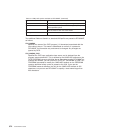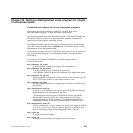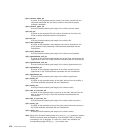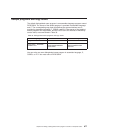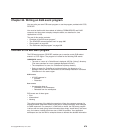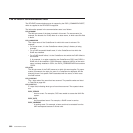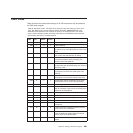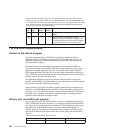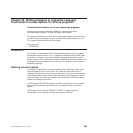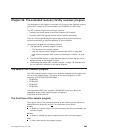
Table 36. EJB event codes (continued). The table shows the event type and meaning of
each event code. The “Bean name” column indicates whether the EJEV_BEANNAME field
in the DFHEJEP communications area contains the name of an enterprise bean. The “DJAR
name” column indicates whether the EJEV_DJAR field in the DFHEJEP communications
area contains the name of a DJAR resource.
Event
code
Event
type
Bean
name?
DJAR
name?
Description
020 I N N A scan of a CorbaServer’s “pickup” directory has
ended.
021 E N Y During a scan of a CorbaServer’s pickup
directory, CICS has discovered a deployed JAR
file with the same name as one already installed
in a different CorbaServer in the same region.
The EJB event sample program
Actions of the default program
The default implementation of DFHEJEP is provided to support the RM for
enterprise beans. It is intended to be installed in CICS regions that are used for
application development. We recommend that you install the default program in
your development regions.
The default program records useful EJB events in a file named DFHADEM. It
records only a subset of all possible EJB events—only the ones that may help an
application developer determine why there is a problem with a DJAR. Because
CICS categorizes each EJB event in one of three types (informational, warning, or
error), DFHEJEP can discard whole groups of uninteresting events by checking for
a single value in the communications area.
Your application developers can use the RM for enterprise beans to query the
contents of DFHADEM. This enables them to check the outcome of DJAR requests
and the status of DJAR resources in the region.
Before recording any events, the default program determines (by checking for the
existence of file DFHADEM) whether the RM for enterprise beans is being used in
the region; if it is not, the default program records no events and ends. This means
that there is no processing overhead in a production region, in which the RM for
enterprise beans would not normally be used.
Writing your own EJB event program
You can write your own EJB event program in any of the languages supported by
CICS. The default EJB event program is a C language program named DFHEJEP.
The source of the default program is provided in C. The corresponding copy book
that defines the communications area is provided in assembler-language, C,
COBOL, and PL/I. The names of the supplied source programs and copy books,
and the CICSTS32.CICS libraries in which they can be found, are summarized in
Table 37.
Table 37. EJB event programs and copy books
Language Member name Library
Programs: C DFHEJEP SDFHC370
682 Customization Guide



